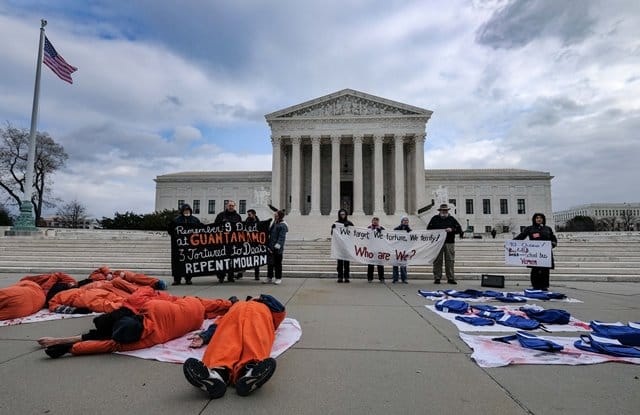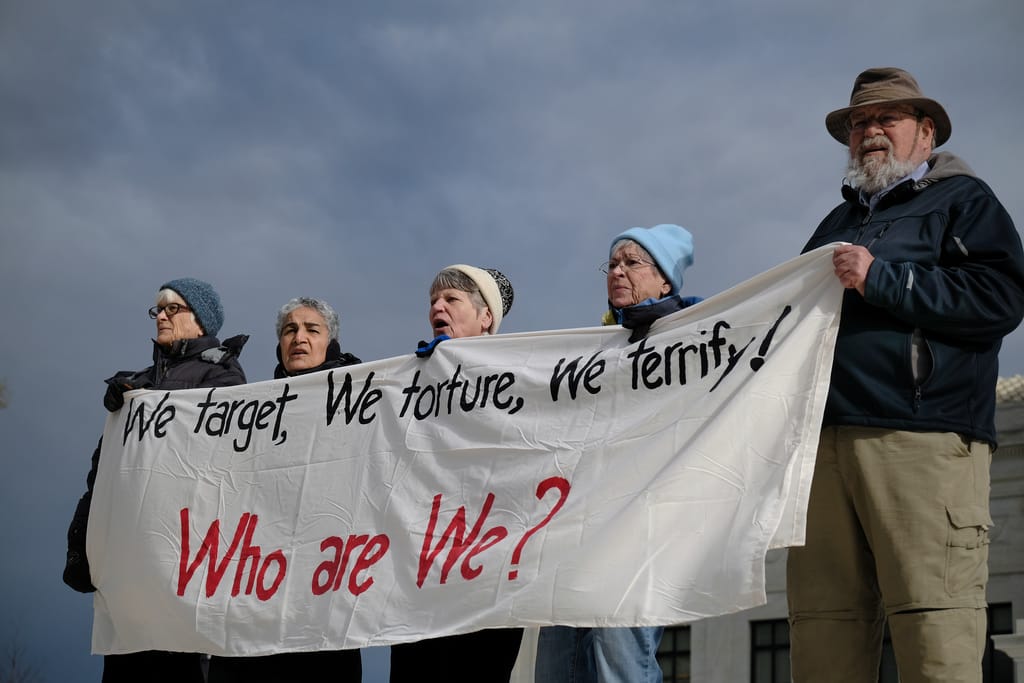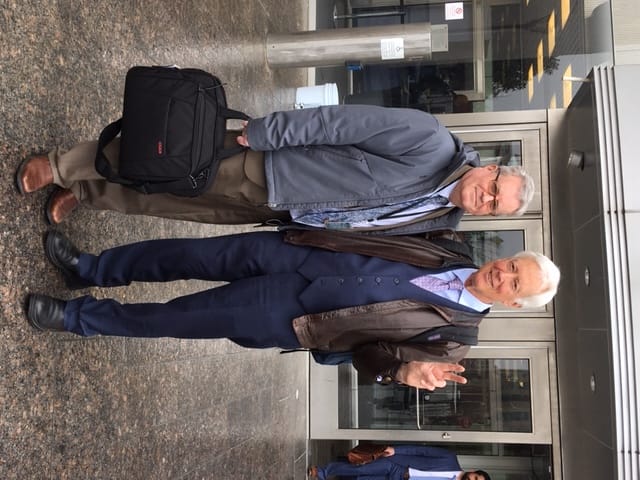March 29, 2019
On March 27, U.S. District Court Judge Deborah A Robinson granted Manijeh Saba’s Motion for Judgment of Acquittal of the charge of illegally protesting on the steps of the Supreme Court on January 9, 2019. She agreed that the government failed to show that Manijeh had violated the statute by bringing into public notice a party, organization or movement. Judge Robinson went on to explain that although she appeared as one of five holding a sign, the sign did not refer to a party, organization or movement. The sign read, “We Target, We Torture, We Terrify: Who Are We?” There was no mention of Guantanamo Bay on her clothing or on the sign or in the words to the song they were singing: “Know where you stand — No More War; Know where you stand and stand there!”
Manijeh’s trial began on March 6. On March 27, she continued her cross-examination of Supreme Court Chief of Police, Jeffery Smith. Acting as her own attorney (pro se), she asked carefully constructed questions making the point that the charged offenses, and subsequent treatment during over 24 hours in police custody, were far harsher than the defendant’s nonviolent conduct warranted.
Here is an excerpt from her cross examination of the Supreme Court Chief Of Police:
Saba: Were we orderly and peaceful? Smith: Yes
Saba: Is it true that we did not interfere with ingress or egress to the Supreme Court? Smith: Yes
Saba: Was it standard procedure to arrest me? Smith: Yes.
Saba: Did you know they would hold me overnight? Smith: Yes.
Saba: Was it standard procedure not to have a phone call? Smith: I can’t answer that.
Saba: Was it standard procedure not to have enough clothing? ….. My outer garments were removed and held, and when I was released from jail without any ID or money I had to find my way back to the Supreme Court without winter garments. Smith: That was transport. I cannot speak for what happened.
When all the testimony had been presented, Manijeh delivered her Motion for Judgment of Acquittal (MJOA), a motion asking that the charges be dropped. Her statement began:
Firstly, the law is too broad, as Chief Judge Howell articulated [in Hodge v. Tarsi]. The law is intended to ensure decorum and prevent disruptive demonstrations that would prevent ingress or egress to the Court, which did not occur in this case. Therefore, a conviction for being behind a banner on the lower steps is not in keeping with the intention of the legislature and is an improper application of this law.
Secondly, the charge is for a de minimus violation which should not result in a conviction. There is no signage to indicate that you lose your first amendment rights at the temple of justice, the very place where such rights should be protected. There was no proper warning, since the police could have easily told us that we could lawfully demonstrate just a few feet away on the sidewalk. It is not proper for the police to say that the warning is meaningful, since they say “You are in violation of Title 40″ – am I really in violation of all several hundred pages of that title of the US code?
Judge Robinson obviously understood the reasonableness of Manijeh’s MJOA and the importance of the First Amendment. After hearing the government’s and defendant’s testimony and reviewing the videotape of the arrests and arrest photos she concluded that the government failed to offer evidence that their purpose was for assemblage or display to bring into public notice a movement. Moreover, she stated that there was no proof that Manijeh was in a nexus with the people on the sidewalk who were protesting Guantanamo.
Afterwards Mark Goldstone, her Attorney Advisor, said, “Manijeh Saba has tirelessly advocated for First Amendment freedom of speech rights since becoming a citizen many years ago. She spoke out non-violently on the steps of the Supreme Court. She defended herself in Court and her voice was heard as she won an acquittal using her voice to speak truth to power.”
Manijeh’s persistence should give us hope, even in the times when we do not prevail in court. She had no idea she would be acquitted when she said in her opening statement on March 6:
I engaged in a peaceful, inspiring demonstration against unending bombing and killing of Yemenis that our government supports. With respect to Guantanamo, I was protesting the unlawful detentions and demanding the release of five Muslim men who have been approved for release, and 32 Muslim men who shouldn’t have been detained in the first place, as determined by the courts. I was standing on the safe public grand plaza of the Supreme Court. I crossed no barrier or barricade. My conduct was heartfelt and peaceful in defense of my inalienable right to speak for peace and Justice. Therefore, it did not seem reasonable to me for the officer to stop us from speaking out peacefully by arresting us.
Manijeh’s legal defense was expensive and although WAT has been able to contribute some from general funds, she’s still got a long way to go. To help her, write checks out to Witness Against Torture, with “Manijeh legal defense” in the subject line and mail to:
New York Catholic Worker
Attn: Witness Against Torture
55 East Third St.
New York, NY 10003










